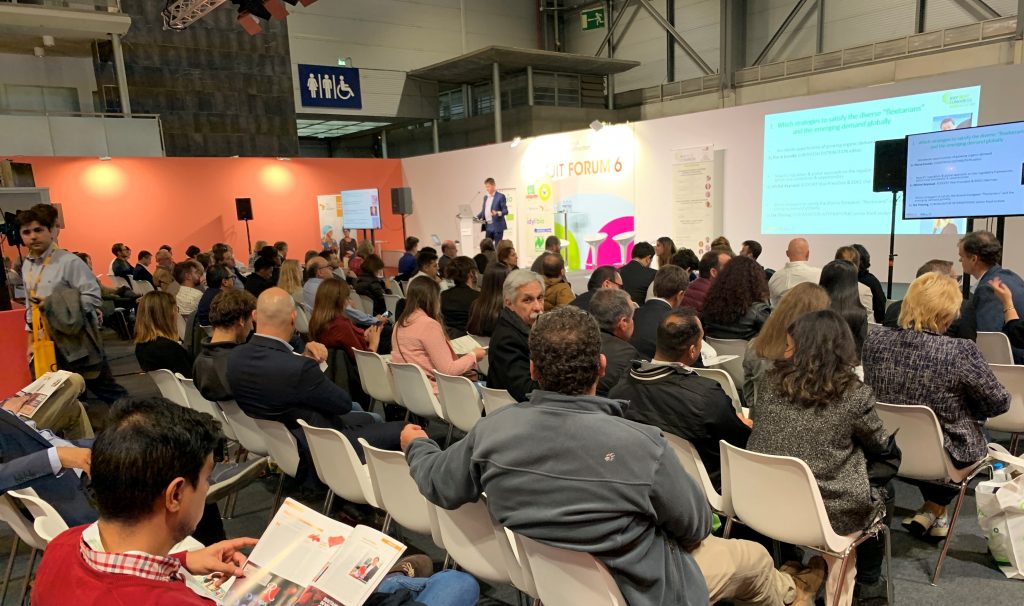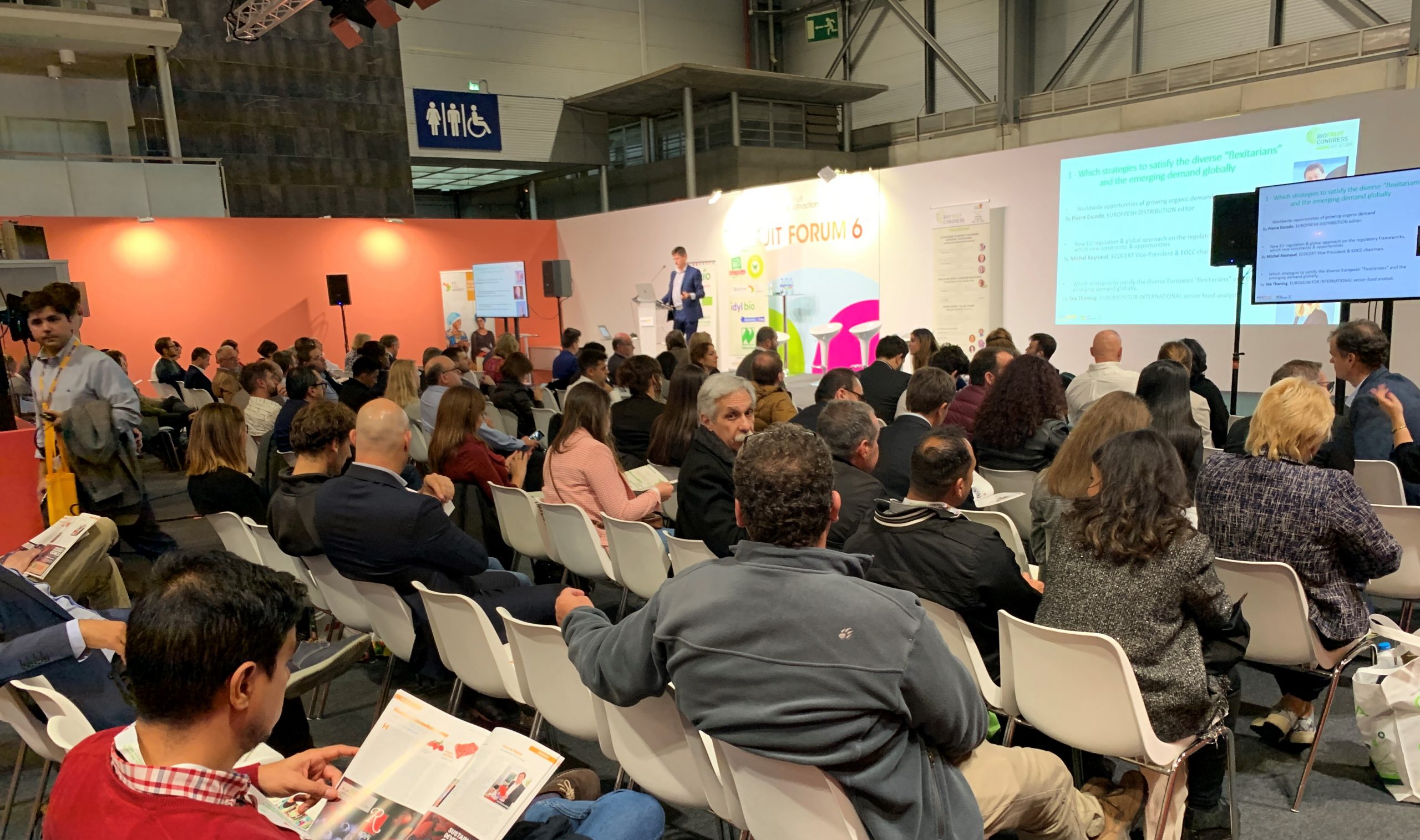Going beyond organic: 2nd BioFruit Congress examines how to fuel and sustain growth in the organic market
The big issues facing the future of the organic produce market were debated on Wednesday, October 23 at the 2nd annual BioFruit Congress. Held as part of the Fruit Attraction fair in Madrid, the congress was organised by EUROFRESH DISTRIBUTION and IFEMA, with the collaboration of PROEXPORT. Topics covered included how to satisfy increasing consumer demand for produce that goes beyond organic production to address wider issues, how retailers are responding to this, regulatory issues, and the impact of other standards and certification in the value chain.
What matters most to organic consumers?
In an overview of the organic market, EUROFRESH DISTRIBUTION editor Pierre Escodo said the global sales for organic fresh food food is now worth €62 million. However, he said the growth of the organic demand is slowing down bellow the annual 10% rate, needs more product innovation and consumer promotion. Consumers are also confused by a multiplicity of messages.. In order to seduce more consumers to move to organic produce, Escodo said it’s important to understand regional differences in what matters most to them. In China and Russia, for instance, truth and transparency about food products are prime, while environmental production and plastic reduction lead as issues for American consumers, and in Europe taste is an overriding factor, he said.
Natural vs Organic
Tea Thaning, senior food analyst at EUROMONITOR INTERNATIONAL, shared results from a global survey by the firm showing nearly 45% of respondents rated ‘all-natural’ as important to them in diets and ingredients, while less than 30% cited ‘organic’.
“It’s important to emphasise the definition of organic to compete with natural claims,” she stressed. Similarly, Thaning said there should be more communication around organic’s contribution to sustainable agricultural practices “Connect organic labelling to the narrative around environmental concerns,” she advised.
EUROMONITOR presentation available at http://bit.ly/2NqllRX
Wide consumer expectations, including fair pay
“Consumers do not just buy organic produce because it’s healthy, but because of the story behind it,” said Michel Reynaud, vice president of ECOCERT, World leader in organic farming certification.
He said consumers not only want strict and transparent rules on organic production, they have wider expectations, including fair pay across the supply chain.
“They also want organic to have an impact on the environment, not only on carbon but water,” he said.
Reynaud also explains the use of “Fair-for-Life” standard, in order to build up a resilient organic and fair trade supply chain in one tool.
Supporting growers during conversion
Cordoba-based Campiña Verde supplies Germany’s REWE Group with organic produce and Jose Tienda, head of its organic sourcing division, spoke of the importance of supporting growers who are undergoing the long conversion process to organic production. Tienda said a good example of this is the Naturgut Junior Helden (‘junior heroes’) range sold at REWE’s Penny supermarket chain, which finds a market for produce from such soon-to-be organic farms. Under the Bio-Helden (‘organic heroes’) organic produce line, Penny also gives growers higher tolerance, allowing the sale of unusual-looking produce and also promoting it in a campaign with a slogan meaning “real organic heroes might have flaws”.
French organic pioneer Biocoop continues to expand
Illustrating the sturdiness of organic demand in France, the leading European organic chain BIOCOOP spans 3,200 farms and 600 specialist organic stores there. Its retail turnover in 2018 was up 10.4% to €1.2 billion and it plans 70 store openings over 2019, according to David Siffert, head of Biocoop’s fruit and vegetable division. The organic market has changed considerably in the last few years and reflecting this, today Biocoop favours suppliers who are committed to sustainability and transparency, he said.
Multi-certification a challenge
The event wrapped up with a panel discussion on value-adding beyond official organic certification which featured DEMETER INTERNATIONAL head of certification for Spain & Latin America Eduardo Tilatti, BRIO SPA (ALEGRA GROUP) commercial director Anton Carra, PLANET PROOF program manager for F&V Stefanie de Kool, COLLECTIF NOUVEAUX CHAMPS (0 residue) chairman Bruno Vila and FIBL Europe director Miguel de Porras.
Miguel de Porras from FIBL commented the economic impact of multiple certification for produce under different standards such as FairTrade, and Rainforest Alliance. He said producer groups are finding it increasingly challenging to manage this range of standards, which can mean a lot of extra work in maintaining records and even separate audits.
Eduardo Tilatti from DEMETER INTERNATIONAL revealed the experimental program of cultivating and packing with 0 plastics, testing the use of paper, water resistant and fully biodegradable. Demeter international certifies today biodynamic 5300 farms and 183000ha worldwide. “The economic empowerment of small farmers and their local communities is part of our fundamental values, along with Biodiversity, Carbon foot print and soil fertility” commented Tilatti.
BRIO SPA (ALEGRA GROUP) commercial director Anton Carra share its experience of developing organic markets overseas like Brazil & Asia, the developing new organic lines like kaki and pomegranate. Brio is also involved in multiple value-chain programs like Demeter, Naturland, FairTrade pineapples from Togo and the new European promotion campaign “Made in Nature”.
PLANET PROOF program manager for F&V Stefanie de Kool explained why the Dutch protocol “Milieukeur” is getting international, in response to the demand of the Dutch retailers and how it is helping the stakeholders of other countries to organize for more ambitious sustainability goals and achieve a reduction of environmental impact up to 50%.
COLLECTIF NOUVEAUX CHAMPS (0 residue) chairman Bruno Vila explains how the new « 0 residue segment is positioning between the conventional and organic lines, responding to a consumer segment which is aiming to consume residue free produce, a major concern among the French consumers. Just created 18 months ago, 0 residue certified produce represent €59 millions of revenues and 23,000 tons of fresh fruit & vegetables marketed.




